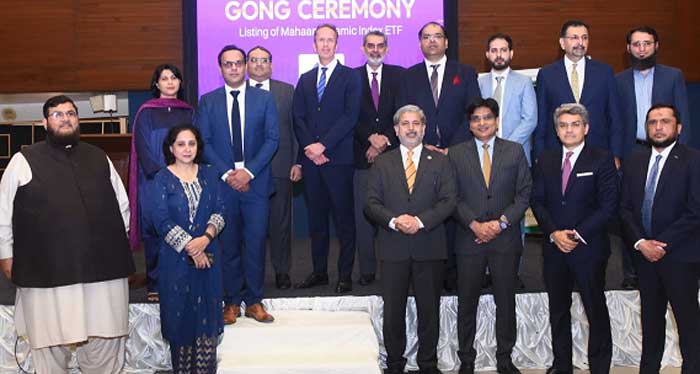In a glittering ceremony held at the Embassy of Pakistan in Beijing, Ambassador Luo Zhaohui, Chairman of the China International Development Cooperation Agency (CIDCA), was bestowed with the prestigious Hilal-e-Quaid-e-Azam by the Ambassador of Pakistan. The honor was conferred in recognition of Ambassador Luo’s exceptional contributions to strengthening the bond between China and Pakistan. Ambassador Luo also served as ambassador stationed in Pakistan. During award ceremony, Ambassador Khalil Hashmi, in his remarks, lauded Ambassador Luo as a devoted friend of Pakistan, emphasizing his unwavering support and referring to him as a ‘great friend of Pakistan’. This acknowledgment underscores the pivotal role Ambassador Luo has played in fostering diplomatic relations between the two nations. Expressing profound gratitude for the award, Ambassador Luo described Pakistan as his second home, reminiscing about the remarkable support he received during his tenure as China’s Ambassador to Pakistan. This sentiment reflects the deep personal connections Ambassador Luo has forged with Pakistan and its people over the years. The Investiture ceremony, attended by dignitaries, officials, and media from both China and Pakistan, highlighted the significance of the occasion in strengthening bilateral ties. It served as a testament to the enduring friendship and cooperation between the two nations. The Hilal-e-Quaid-i-Azam serves as a symbol of the deepening friendship and cooperation between China and Pakistan, reaffirming their commitment to furthering diplomatic relations. Worth mentioning that Hilal-e-Quaid-i-Azam is a civil award conferred by the President of Pakistan. It is one of the highest civilian honors in Pakistan, recognizing individuals who have made outstanding contributions to various fields, including public service, diplomacy, literature, arts, and social welfare.
CIDCA, under Ambassador Luo’s leadership, has played a pivotal role in promoting development cooperation between China and Pakistan. Established in 2018, CIDCA aims to enhance China’s foreign aid and cooperation efforts, contributing to global development initiatives. The agency’s role in facilitating projects and initiatives in Pakistan reflects the depth of the bilateral partnership and underscores the potential for further collaboration. The future of the CIDCA appears promising, as it continues to play a crucial role in Chinese diplomacy and foreign aid initiatives. As China expands its global footprint and seeks to deepen its engagement with other nations, CIDCA is expected to take on an increasingly prominent role in facilitating development cooperation projects and initiatives around the world. CIDCA’s mandate encompasses a wide range of areas, including foreign aid, international development cooperation, and the implementation of the Belt and Road Initiative (BRI). With China’s commitment to the BRI remaining steadfast, CIDCA is likely to be at the forefront of coordinating and implementing BRI projects, fostering infrastructure development, trade, and connectivity across regions. In addition to its involvement in large-scale infrastructure projects like the CPEC, CIDCA is also expected to focus on areas such as poverty alleviation, healthcare, education, and environmental protection. By addressing key development challenges in partner countries, CIDCA aims to contribute to global sustainable development efforts and promote mutual prosperity. Furthermore, CIDCA’s role in Chinese diplomacy is expected to evolve as China seeks to enhance its soft power and influence on the global stage. Through development cooperation initiatives, CIDCA can help build positive relationships with partner countries, strengthen bilateral ties, and promote China’s image as a responsible and reliable international partner.
In the ever-evolving landscape of international development cooperation, China’s vision for regional development shines through the principles and practices embodied by CIDCA. Established in 2018, CIDCA has become a cornerstone of China’s foreign aid and international development efforts, embodying key lessons that shape the nation’s approach to regional development.
Streamlining and Centralization lie at the heart of CIDCA’s mandate, highlighting the importance of efficiency and effectiveness in foreign aid endeavors. By centralizing coordination and implementation efforts, CIDCA aims to maximize the impact of development projects and ensure resources are allocated strategically to address pressing needs. Policy Cohesion is another pillar of CIDCA’s approach, emphasizing the significance of clear and coherent policies to guide development cooperation activities. With a focus on alignment with broader national and international development goals, CIDCA’s policy formulation efforts lay the groundwork for sustainable and impactful interventions in recipient countries.
CIDCA’s Hands-On Approach underscores the importance of active management and oversight in achieving desired development outcomes. By taking a proactive role in project implementation, CIDCA ensures that interventions are tailored to local contexts and effectively contribute to the improvement of livelihoods and communities.
A Capacity Building Focus reflects China’s commitment to empowering recipient countries to lead their own development efforts. Through investments in human capital and institutional strengthening, CIDCA aims to foster self-reliance and resilience, enabling countries to address their development challenges sustainably. Collaborative Engagement lies at the heart of CIDCA’s approach, emphasizing the importance of partnerships and coordination in tackling complex development issues. By engaging with multilateral organizations and development partners, CIDCA leverages complementary resources and expertise to maximize the impact of development cooperation efforts. Transparency and Accountability are core principles that guide CIDCA’s operations, ensuring that foreign aid resources are managed responsibly and ethically. By promoting openness and accountability, CIDCA builds trust with recipient countries and stakeholders, fostering a conducive environment for sustainable development.
Principled Engagement forms the bedrock of CIDCA’s approach, emphasizing mutual benefit and win-win cooperation in international development cooperation. Through principled engagement based on shared goals and mutual respect, CIDCA seeks to foster equitable partnerships and achieve sustainable development outcomes that benefit all parties involved. Overall, CIDCA’s charter provides valuable lessons for China’s vision for regional development, highlighting the importance of strategic planning, effective governance, collaborative partnerships, and principled engagement in advancing international development cooperation efforts and contributing to global development goals. As China continues to play a leading role in global development, CIDCA’s principles and practices serve as guiding lights for a brighter and more sustainable future for all. CIDCA is poised to continue playing a central role in advancing China’s foreign policy objectives, promoting economic cooperation, and fostering mutual benefit and development cooperation with countries around the world.
The bonds between China and Pakistan deepen through ongoing diplomatic efforts, moments like the acknowledgment of Ambassador Luo’s contributions stand as pivotal markers along the path to enhanced collaboration and shared prosperity. Such occasions not only symbolize the strength of their relationship but also inspire confidence in the bright prospects of their enduring partnership.
China’s vision for regional development: Lessons from CIDCA’s practices




